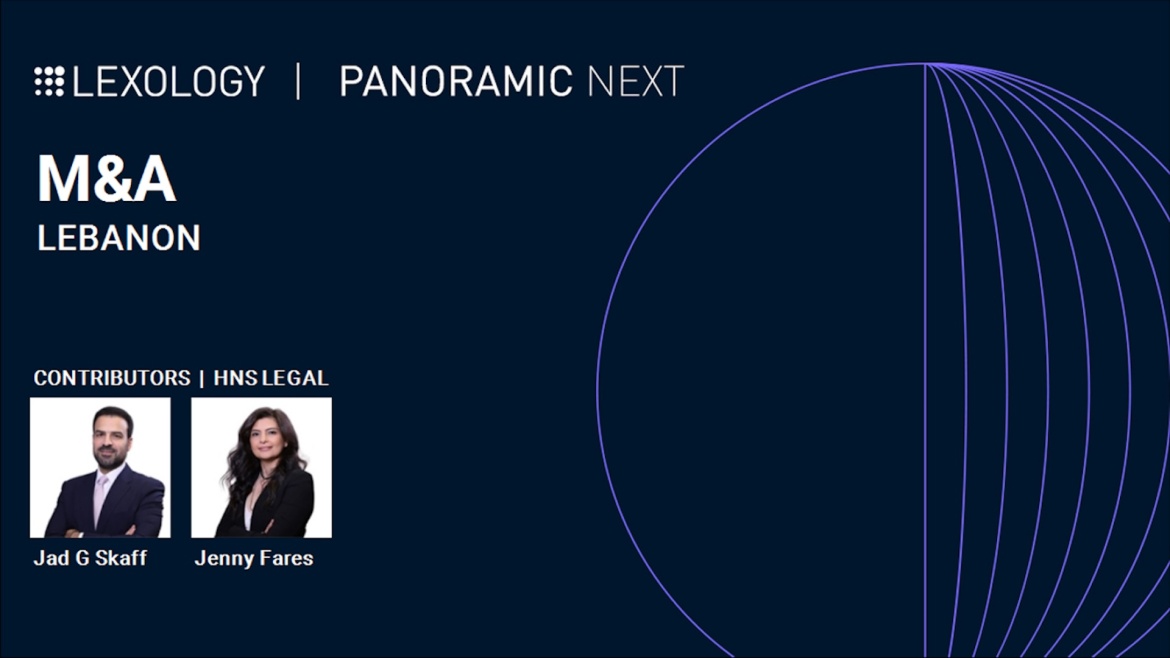HNS Founding Partner Jad Skaff and Senior Associate Jenny Fares share insights on recent global M&A trends and how legal professionals are adapting, in Lexology's latest article 'Panoramic Next: M&A', which explores the most impactful recent developments in global M&A and how legal practitioners have responded to them.
What trends are you seeing in overall activity levels for mergers and acquisitions in your jurisdiction during the past year or so?
Given the ongoing economic climate in Lebanon, whereby the nation has seen an unprecedented liquidity crisis, and bank depositors have witnessed their funds being ‘trapped’ within local banks, and due to the recent turmoil happening at the Lebanese southern border and the geopolitical tensions in the region, mergers and acquisition transactions in Lebanon have been very limited, and no major investments have been recorded.
Given the ongoing economic climate in Lebanon, whereby the nation has seen an unprecedented liquidity crisis, and bank depositors have witnessed their funds being ‘trapped’ within local banks, and due to the recent turmoil happening at the Lebanese southern border and the geopolitical tensions in the region, mergers and acquisition transactions in Lebanon have been very limited, and no major investments have been recorded.
Having said that, and due mainly to the economic crisis, we have witnessed in the past two years the restructuring of some distressed companies via acquisition transactions. These transactions are mainly the result of the lack of the borrowing activity from banks and financial institutions and the lack of liquidity in the market. The shareholders of these distressed companies, mostly family-owned and other small and medium-sized enterprises (SMEs), instead of seeking financing from banks, were willing to bring in new investors by selling them minority stakes in their companies, against the payment by the new investors of the company’s bank debts in ‘lollars’ (ie, Lebanese dollars), being dollars trapped in the Lebanese banking system. These restructuring transactions were also advantageous to the investors who had the opportunity to redeploy their trapped funds into local businesses – for example, to target reinvestment in manufacturing businesses with capabilities of exporting locally produced products in order to survive the hyperinflation season in the country.
These transactions, if carefully executed, allowed investors to capitalise on bank-deposited funds that are most likely to be lost amidst incoming economic reform plans, and thereby collect US dollars in the form of dividends generated through export operations of local businesses.
However, these types of transactions are no longer frequent as the majority of the companies were able to repay their bank debts with major discounts, or to restructure their debts directly with banks, which are accepting the repayment of debts with a discount of approximately 70 per cent. Another type of M&A deals that we have seen in the past couple of years consisted of the sale by foreign investors of their stakes in Lebanese companies as they wanted to exit the Lebanese market, which became too risky for them and affected their consolidated balance sheets. Other regional and international groups, whether initially Lebanese or international, decided to carve out their Lebanese operations from the groups and put them under a different shareholding structure for the same reasons.
Apart from the above restructuring transactions, and as a comparison with the neighbouring countries, mainly the Gulf countries, the M&A activity in Lebanon has always been limited in size and number, due mainly to the size of the Lebanese market, which is dominated by SMEs and small family businesses, and to the fact that mergers and acquisitions between such entities are typically conducted privately in the absence of any disclosure requirements or specific M&A regulations.
According to the World Investment Report 2024 published by the United Nations Conference on Trade and Development (UNCTAD), the foreign direct investment (FDI) inflows to Lebanon in 2023 was around US$655 million. In terms of FDI outflows, in 2023 it was around US$73 million.
Which sectors have been particularly active or stagnant? What are the underlying reasons for these activity levels? What size are typical transactions?
Due to the economic crisis and to the current turmoil that Lebanon is facing all sectors have been stagnant apart from some deals mainly in the industrial and retail sector that took place due to the crisis and took advantage of the devaluation of the local currency for the payment of debts with major discounts.
The merger and acquisition of banks and financial institutions is a hot topic in the country. However, the government has to date not put in place any clear plan for the restructuring of banks, and has not yet witnessed any M&A between banks. It is worth noting that M&A concerning banks and financial institutions is governed by the Lebanese Code of Money and Credit (articles 132/b-d and 133/b-d), the provisions of Law 192 of 4 January 1993 and its amendments pertaining to the facilitation of bank M&A, and Law 308 of 3 April 2001 governing the issuance and trading of stocks and bonds.
Since M&A transactions are being conducted privately, given that they involve family-owned businesses and SMEs, there is a lack of data on the subject, as the frequency and size of these transactions remain confidential between the stakeholders concerned.
In the past few years, prior to the crisis, venture capital market was very active in Lebanon due to financial incentives granted by the Central Bank of Lebanon under Circular 331, by encouraging commercial operating banks in investing indirectly in start-up companies mainly in the technology industry and e-commerce. Unfortunately, due to the economic situation, these schemes based on Circular 331 have failed to achieve their goals and have been stopped.
What were the recent keynote deals? What made them so significant?
The recent keynote deal is a merger transaction that occurred in the summer of 2021, where two local Lebanese insurance companies, LIA Insurance SAL and Assurex SAL have merged, leading to the creation of a new entity LIA Assurex SAL. This transaction was significant as merger transactions are rather rare in comparison to acquisitions, which are more commonly used due to their tax efficiency and swiftness compared to mergers.
Another acquisition occurred during the third quarter of 2023 where a leading global strategy consulting firm acquired a highly regarded Lebanese consulting firm with a footprint in other GCC countries. This deal is significant as it shows that Lebanese expertise in the consulting field is still coveted and that consulting giants are willing to invest in Lebanon, despite the crisis and other risks that the region faces on an ongoing basis.
Another recent deal was the exit of the internationally renowned Allianz group from Lebanon by selling its operations to a Lebanese private equity group.
In your experience, what consideration do shareholders in a target tend to prefer? Are mergers and acquisitions in your jurisdiction primarily cash or share transactions? Are shareholders generally willing to accept shares issued by a foreign acquirer?
The primary preference for shareholders as a consideration in mergers and acquisitions in the Lebanese market is a cash consideration. However, a mixed consideration of cash and shares may be used, mainly in transactions where the buyer is a multinational company, offering to purchase the totality of the target shares against the payment of a part of the purchase price as cash consideration and the other part as a shares consideration in the upper entity, provided that the shares of the buyer are publicly traded in order to enable the seller to sell the shares at a value determined by the market. These shares may be also vested during a vesting period during which some requirements or key performance indicators should be met by the target.
The shareholders may be interested in receiving a part of the consideration in shares of the foreign acquirer, due to the fact as by diversifying the consideration they will be protecting a part of it from any possible capital control and devaluation similar to what Lebanon has witnessed in the past few years. Shares in local acquirers are currently not interesting as most of Lebanese companies are struggling to maintain good financials in the market and the shareholders will not be willing to take shares in local companies.
Share-to-share consideration may be envisaged in the case of merger transactions where two entities will be joining forces and both will be receiving a portion of shares in the merged entity.


